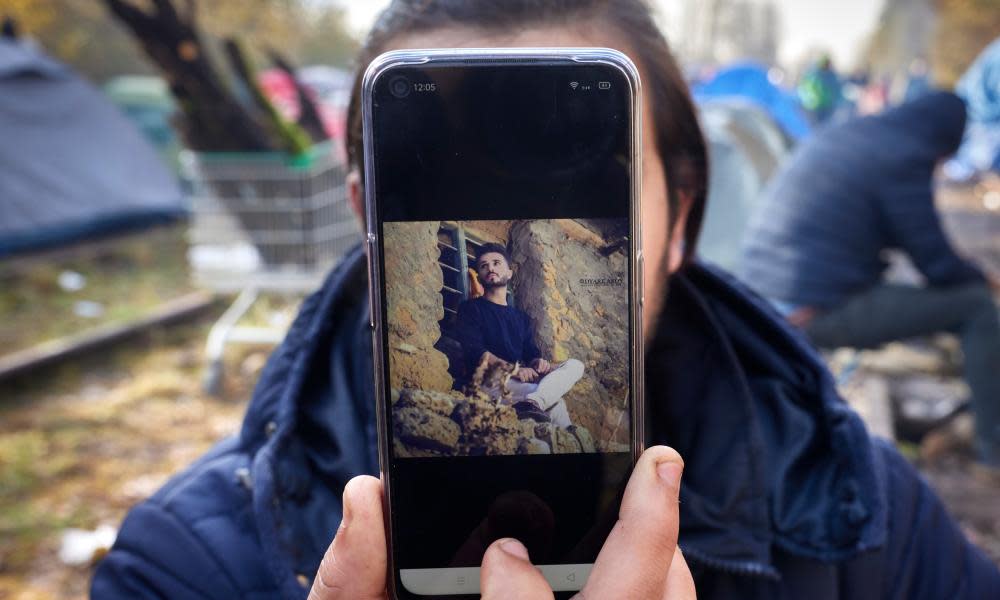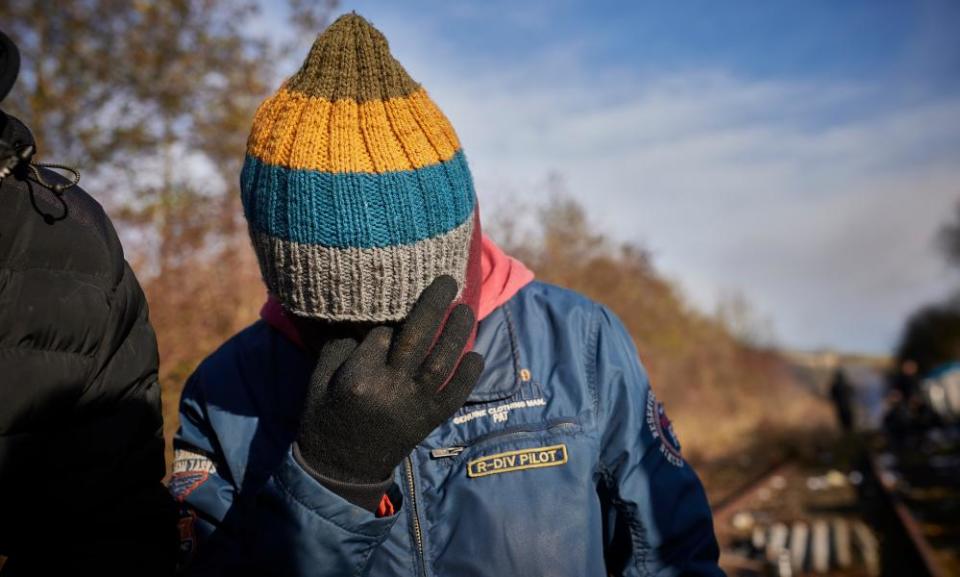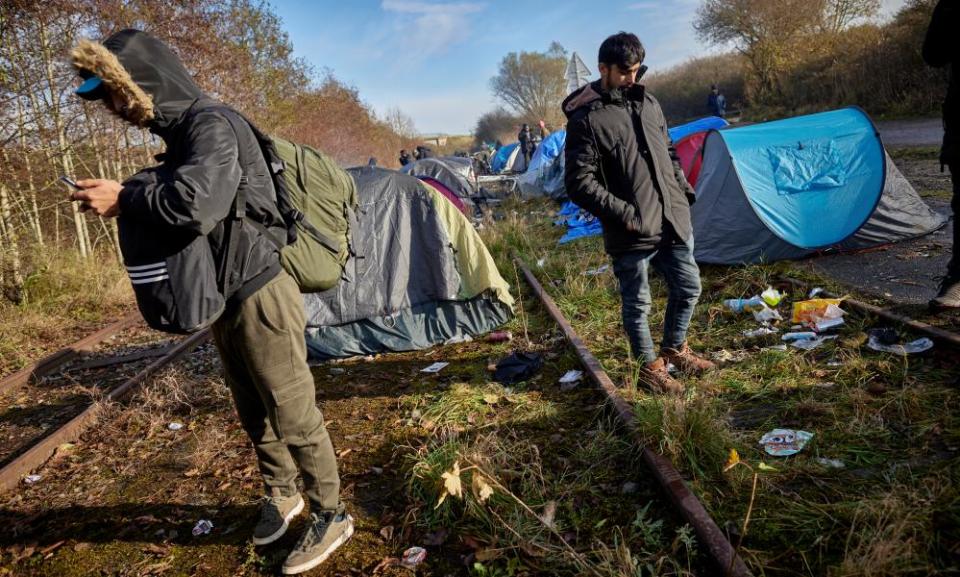‘He’s missing’: anxious wait in Calais camps for news on Channel victims

In northern France, friends and relatives of those who died in the tragic crossing on Wednesday are desperate for answers
On Saturday Gharib Ahmed spent five hours outside the police station in Calais, desperately waiting for news. “It was so cold. There was no answer,” he said. Ahmed was seeking confirmation that his brother-in-law Twana Mamand was one of 27 people who died in the Channel on Wednesday after the flimsy dinghy taking them to the UK sank. “I want to see his body. I have to understand,” Ahmed told the Guardian.
Relatives of the mostly Iraqi Kurds who perished in the world’s busiest shipping lane spent the weekend in a state of anxiety and confusion. Ahmed said he last heard from his brother-in-law at 3am on Wednesday, around the time Twana set off in darkness from a beach near Dunkirk. After two days of silence, Ahmed travelled with his wife, Kale Mamand – Twana’s sister – from their home in London to northern France, arriving on Friday night.
The bodies of those who died were taken to a basement mortuary inside Calais hospital on the outskirts of the port. According to Ahmed, French detectives told him it would not be possible to definitively identify Twana until 10am on Monday, when the hospital facility reopens. “They have done DNA tests. They explained that sometimes you don’t recognise, if you see a body, that faces can change or be bruised, and that DNA is better,” he said.
Ahmed said he was unwilling for now to accept that Twana was gone. In the meantime, he was spending his hours on the phone, talking to family who live near the town of Ranya in Iraqi Kurdistan, and to Iraqi government officials who have offered to bring Twana’s body home, and to local refugee charities. “I don’t want to make anyone happy or sad until we know for sure,” he said. “There are six to eight families in the same situation.”

Exactly what happened last week is unclear. Twana was part of a group that included his friend Harem Pirot, and another young Kurdish man, Muhammad Shakar. Also on the boat was a family of four from the Iraqi Kurdish town of Darbandikhan: Khazal Hussein, 45, and her children Haida, 22, son Mubin, 16, and younger daughter Hasti, seven. Shakar appears to be one of only two survivors. He and a Somali refugee were pulled from the water, suffering from hypothermia and exhaustion, after French fishers raised the alarm.
Relatives said Shakar had decided to travel to the UK from Kurdistan to earn money for his sister, who needs medical help. The family is contemplating setting up a crowdfunding page. Shakar never made it to London and is in Calais hospital, recovering from his ordeal. His evidence is likely to be used in future prosecutions against the suspected Kurdish smugglers who arranged the ill-fated crossing, five of whom French authorities have arrested. It may also help answer the key question: what caused their rickety boat to sink?

In the camp where Twana stayed near Dunkirk before setting off on a dinghy, there were further painful questions. Nassar Mustafapor, 27, said he was searching for information about his friend Sirwan Alipur, 23. “He’s missing. We don’t know what happened to him,” said Nasser, showing a photo of his friend. Alipur was among dozens of Iraqi Kurds who made the crossing on Wednesday night under what seemed like perfect conditions – a flat sea and clear sky. He could now be in the UK or in a morgue, Nassar said.
Despite Wednesday’s tragedy, many of those in the camp in the suburb of Grande-Synthe said they intended to take a boat to Britain. The weather conditions are now terrible. Few dinghies seem to have launched in recent days. On Saturday evening torrential rain and heavy winds lashed the row of tents where the Iraqis – together with a handful of Afghans – are camping out, next to a canal and woods. There are no toilets or running water. It is a grim existence, made worse by the relentless cold and lack of news.
Remarkably, residents seem to be stoical about their situation. They say they have no choice but to tough out the winter conditions until they can reach the UK. One group was busy building a makeshift restaurant from logs; friends who met each other in Turkey on the long overland journey to France were sitting around a bonfire, next to a disused railway track. There were a few families among the young men. A husband and wife had brought their two disabled children with them on an uncertain odyssey; their wheelchairs parked neatly next to a tent.
“It’s too cold. We have to try to get to London,” said Amanj, a 20-year-old Kurdish political activist from Iran. He explained that smugglers would turn up in the camp when the French police were not there. They usually wore masks. “They come when the weather is good. You can’t see their faces. They will say if tomorrow is good [to go by boat] and ask if you want to come with them. If you say yes, they ask for your WhatsApp. And then they collect you in a van and take you to the beach.”
Amanj said Twana’s friend Pirot had tried multiple times to cross the Channel before his attempt on Wednesday, which led to his death. Some of their group were now having second thoughts, he said. But he added that he still intended to cross. “I will do it,” he said.

 Yahoo Movies
Yahoo Movies 
